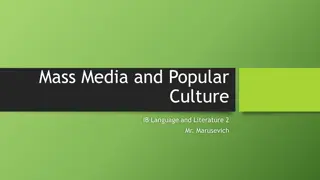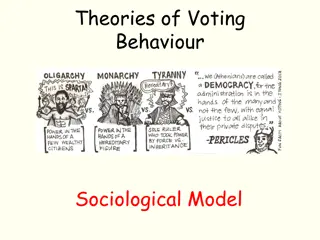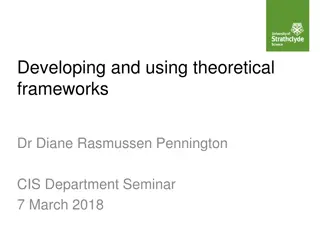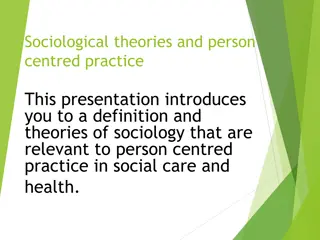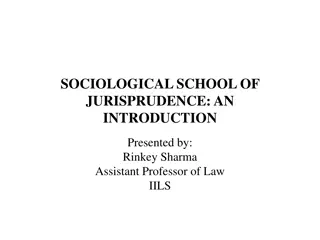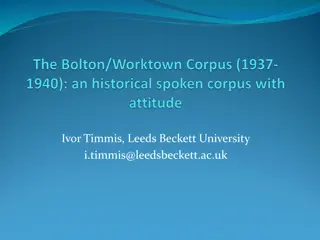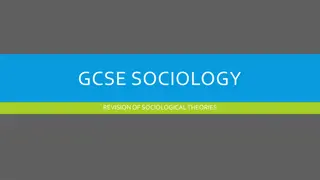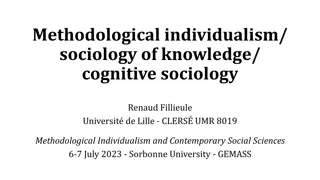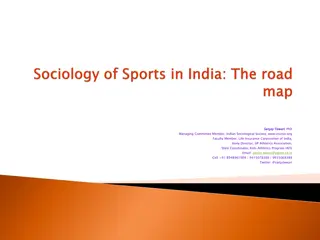Understanding Sociological Theories and Frameworks
Sociological theories, encompassing micro and macro perspectives, provide a lens to interpret societal dynamics. Consensus theories like functionalism emphasize shared norms, while conflict theories such as Marxism highlight social inequalities. Social action theories like interactionism focus on individual interpretations within society. These frameworks aid sociologists in analyzing data and understanding societal structures and interactions.
Download Presentation

Please find below an Image/Link to download the presentation.
The content on the website is provided AS IS for your information and personal use only. It may not be sold, licensed, or shared on other websites without obtaining consent from the author. Download presentation by click this link. If you encounter any issues during the download, it is possible that the publisher has removed the file from their server.
E N D
Presentation Transcript
Preparing for A level Sociology Use the following PowerPoint to complete the summary booklet needed to revise for the baseline assessment. Sociological theories provide a sort of framework which enables sociologists to make sense of how society works and what causes society to change. Introduction to Sociology Slide 1- What are Micro and Macro theories? Slide 2- Consensus Slide 3- Conflict Slide 4- Social Action What are Metanarratives or Grand Theories? Slide 5-7 Functionalism Slide 8-10 New Right Slide 11-13 Marxism Slide 14-15 Weber Slide 16-17 Feminism What are Social Action Theories? Slides 18-20 Postmodernism
Micro /macro theories Micro theories Focus on the detail in society and how individuals interact with society and each other. They allow sociologists to use Micro theories which allow on-ground analysis but ignore larger pictures including inequalities. Macro theories Focus on the bigger picture , on society as a whole and how the parts of society interact with each other. Macro theories allow sociologists to see large scale issues but tend to ignore individual differences.
Variety of theories Many sociologists see themselves as social scientists who collect data to interpret society. They need a framework to analyse data and the theories allow them to do this. These theories are built around key ideas such as the norms and values of society. Consensus theories One group of theories that include functionalism and the New Right. These theories are based on majority agreement, with shared norms, values and beliefs. They focus on the social order in society where everyone knows what is expected of them. These theories examine how society works together so that everyone gets what they need. They also make sure society is prepared for the future e.g., Education.
Variety of theories Conflict theories Another group of theories that seek to make changes to society. These include Marxism and feminism. Their starting point is that social inequalities exist, you cannot achieve consensus as society serves those that have the most power. They claim that although there may appear to be consensus, this is based on people accepting their subordinate positions I know my place . They use the concept of ideology, a set of values and beliefs used in society, to describe how the powerful manipulate society to justify why they hold power and should continue to maintain that. For example, under slavery in southern states of the US they used a variety of arguments to say black people were inferior. They claim that where inequalities exist they may only erupt from time to time eg George Floyd. Class sketch - https://www.facebook.com/thejohncleese/ videos/1870718759725920/
Variety of theories Social action theories These include theories such as interactionism and labelling theory. Whereas consensus and conflict theories focus on structures, something external to the individual (macro theories), interactionism is a micro theory, looking at the individual themselves. They are sometimes called Interpretivist because they seek to understand how individuals interpret their social world.
Functionalism Main sociologists: Durkheim, Parsons This is the most influential consensus theory in sociology. Durkheim says that we need to feel social solidarity, a feeling of belonging and a shared identity. People need to feel they have a place in society or this leads to anomie, a sense of normlessness or uncertainty how to behave. Parsons emphasised the role of socialisation in creating value consensus key institutions education, media, religion, families, peer groups - Transmit norms and values to new generation ensuring stability - Organic analogy like a body, all have part to play Functionalism referred to as structural theory as see parts of society linked as a structure, or relying on each other. Functionalist Theory
Functionalism Functionalists analyse social institutions in terms of their function (role or purpose) they perform for society eg., Durkheim saw religion as creating a sense of solidarity through shared worship and shared symbols, creating a feeling of belonging. Parsons saw society as a social system AGIL shown below Institutions that help people adapt to environment and also environment to needs eg economy Institutions that help organise people and decide society s goals Eg political parties Institutions that help unify all other parts of society Eg religion Institutions that help to pass on the culture eg families and education
Functionalism evaluation Strengths Most influential up to 1950s Useful to analyse how different parts of society work together to provide for members needs Highlights how societies are more effective when people co-operate Weaknesses Lost support with modern day sociologists Fails to explain conflicts Assumes society benefits everyone equally Clashes in differing cultural norms and values eg role of women, homosexuality Appears to support the ideologies of the powerful
New right Main sociologist: Murray The New Right is a political viewpoint more than a sociological theory, based on ideas by economist Adam Smith (18th century) capitalist societies work best when there is a free market. This means that government should not interfere by, for example, setting wage limits or restricting trade (eg train companies compete). Smith described the hidden hand of the market supply and demand Revived in 1944 by thinkers such as Hayek who claimed this gives individuals freedom. Although state systems to protect people to stop poverty and unemployment may be well meaning it is bad for society as a whole, causes more problems. Hayek disagreed with nationalised companies such as electricity and saw the welfare state as a road to serfdom (benefit reliant) Influenced Margaret Thatcher Prime Minister 1979-1990
New right Murray is most influential New Right thinker who argued that in UK and USA excessive government help has led to dependency culture and the emergence of the underclass, separated from society and lacking commitment to the norms and values of wider society (eg hard work, self discipline, raising children within a marriage). Murray (1990) blames rising levels of crime in UK and USA on the underclass, especially focusing on growing numbers of single parents with increasing numbers of poor children growing up without a father figure and so turn to gang life and crime.
New right evaluation Strengths Have some similarities with functionalism Supports capitalist economic system Marsland argues that British sociologists too influenced by Marxism and fail to teach students about benefits of capitalism Provide counter-balance to mainly left-wing sociological theories Weaknesses Not based on clear sociological evidence Murray claims poor people are feckless but this is not supported by studies of single parents and those in poverty groups Most studies find poorer people have the same aspirations and desire to follow same norms and values but cannot because of inequalities in society
Marxism Main sociologist: Marx Marxism Explained Most influential conflict theory based on ideology of Karl Marx. He claimed that all societies developed into class divisions with the powerful exploiting the poor. He called modern day societies capitalist based on the ruling by those who have capital (money, buildings, factories) who use this to make themselves richer and more powerful. He called these the bourgeoisie. Marx claimed this exploited the working classes, who Marx termed the proletariat, formed of the majority of the people. They have no wealth so must work for a wage. Marx said they were exploited by this system as most of the profit went to those that owned the means of production (factories, businesses). Marx claimed that the proletariat were persuaded to accept this situation by developing ideological state apparatuses (ISA) these are the agencies such as education and the media - that are use to maintain the power of the bourgeoisie. For example, widespread use of media keeps people happy enough as they are entertained and not question their lack of power. Marx called this false class consciousness, as working class cannot see a different ways of living. However, Marx argued that eventually the proletariat would see the unfairness of society and revolt against the power structure.
Marxism evaluation Strengths Most influential from 1960s Interpreted in different ways by sociologists Offers a critical viewpoint to capitalism Understands the issues as social inequalities continue to increase Offers an explanation for this Weaknesses Faces some criticisms eg working class are brain washed into false class consciousness Even though there are inequalities, capitalist societies still have a comparatively better poor (relative poverty) than many who have lived under communism Marxism focus on class differences but ignores other inequalities such as gender, ethnicity and religion
Weber Main sociologist: Weber Who was Max Weber? German sociologist Max Weber disagreed with Marx and his analysis of social inequalities. Weber said that differences of status and power more important and not always linked to economy not all about the money! Eg ethnic minorities treated differently regardless of their wealth.
Weber evaluation Strengths Recognises that class alone is not the only markers of inequality focuses on status and power Understands that even though people may come from a well-off background may still face discrimination Weaknesses Although can be applied to gender inequality Weber does not explain this and how gender can cross power boundaries Does not offer an explanation for how this divide happens (structures) Although he disagreed with Marx in reality most power and status comes from wealth Postmodernists argue that norms and values no longer fixed so status is fluid
Feminism What is Feminism? Although can be linked to aspects of female emancipation (freedom) from 19th century onwards (e.g. suffragette movement) its main influence was from 1970s onwards. Feminists argue that in most societies women face inequality compared to men regardless of class, ethnicity or other sociological divides. For example, males control most businesses, politics and the law. Men also tend to be more dominant in personal relationships. Feminism has encouraged sociologists to focus more on gender inequalities, focussing on the concept of a patriarchal ideology, where all the power lies with men, and the maintenance of these systems.
Feminism evaluation Strengths Recognises the inequalities that women face at least half the population Later versions support intersections eg black, gay woman Weaknesses May focus only on the inequality of women at cost of considering other inequalities Radical feminists accused of over-emphasising the dominance of males Liberal feminists argue that the role of woman has changed over time
Post modernism Postmodernism explained Postmodernism is not strictly a sociological theory because there are many differing views from postmodernists. Most agree that we should focus on small parts of the social world and try to understand them from a variety of viewpoints. Postmodernists reject the idea that there is one right theory and therefore undermine the idea of a social science as cannot be proven. Postmodernism HAS had huge influence on sociology as they start from the point that the age of modernity came to an end in 1990s and we are now in a postmodern world. Whereas modernity struggled with the industrial revolution and machine technology and moved away from religious teachings to a more rational viewpoint we have now moved to an era where knowledge production is more important digital age, media mass communication. They say these are more significant both culturally and economically. .
Post modernism For the postmodernist, people s identities are increasingly defined by personal choice and individualism rather than social structures. People prefer to make their own choices than follow experts in science or religion. Postmodernists question (so you can always use them to criticise) theories such as Marxism and Functionalism as society is now fragmenting and individuals can choose what they want to be.
Post modernism and evaluation Strengths Focus on the changes within society eg globalisation Highlight complexity of identities in the world today Weaknesses Many sociologist do not accept postmodernism as it undermines sociology as a science Whilst their theories are not fact they are based on systematic research and data analysis #blacklivesmatter signposting that people may not be able to choose their identity




